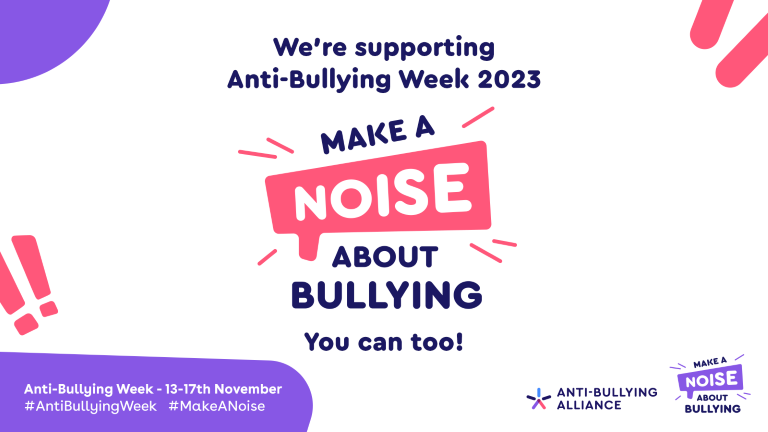Anti-Bullying Week 13 – 17 November 2023
30/10/2023

This Anti-Bullying Week we wanted to share some information with you from one of our Young People’s Mental Health Practitioners.
This year the theme for Anti-Bullying Week is “Make A Noise About Bullying”. The theme came about following consultation with teachers and pupils by the Anti-Bullying Alliance which coordinates Anti-Bullying Week every year in England, Wales and Northern Ireland. Teachers and children wanted a theme that empowered them to do something positive to counter the harm and hurt that bullying causes.
There are different forms of bullying including:
- Cyber/ social media- malicious messaging, sharing private images, imitating others online
- Physical bullying – tripping, punching, nipping, stalking
- Social – encouraging exclusion of someone, spreading rumours/ lying, mimicking
- Verbal – teasing, insulting, swearing, racist or homophobic remarks
Bullying can make someone feel isolated/ alone and feel that they have no one to talk to. It can give them an increased feeling of sadness/ depression or anxiety. For children in schools it can have an effect on their academic achievement and concentration within class.
Warning signs that someone may be being bullied might include:
- Seeming withdrawn and/or anxious
- Decreased self-esteem and confidence
- Increased use of phone – in cases of cyber bullying
- Declining academic achievement
- Wanting to stay of school/ increased physical illnesses
- Property being destroyed or lost
Mate crime
You may have heard of the terms mate crime and hate crime. Maybe you have experienced it but did not know it was a form of bullying. Mate crime is when someone says they are your friend, but they do things that take advantage of you, like ask you for money.
If you are being bullied (or are concerned that someone you know is) we would recommend:
- Communication with others – whether this be a parent/ carer or a friend talking about what is happening to you
- Reporting it – if it is within school reporting bullying to a professional/teacher or pastoral lead so action can be taken. If you do not feel comfortable doing that most schools have a counsellor/ welfare officer or school nurse you can also report this to. If it continues to happen then incidents need to be reported each time until it stops. Bullying can also be reported via police/ law enforcement if a crime has been committed, such as threats/ assault.
- If it is cyber bullying you can report this via online platforms on social media pages, you can block the account or change privacy settings so you can control who contacts you
- Keeping a record of what is happening to you as evidence, text messages/ photos/ emails or posts
- Learning stress management techniques, such as grounding / breathing to cope with feelings of anxiety/ stress. Find out more via our self-care hub.
- Reaching out to organisations for support like Childline or Manchester Mind